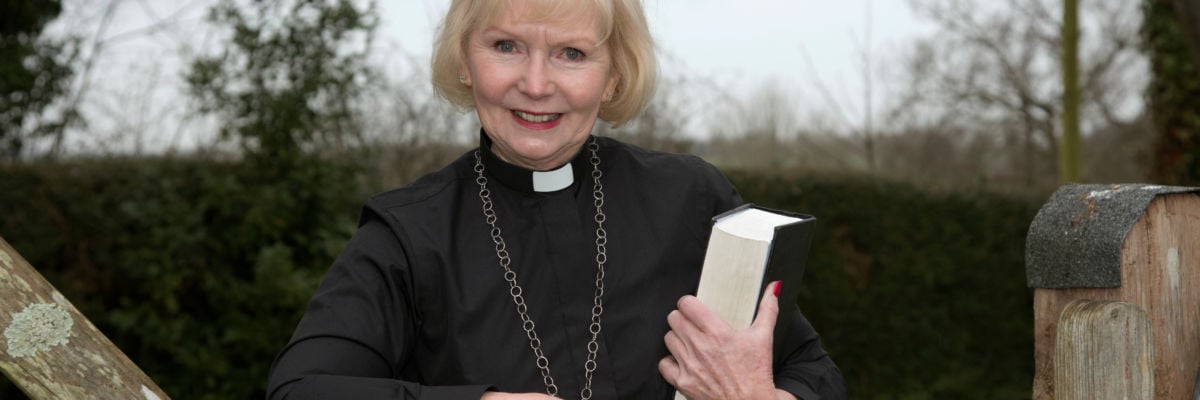
In this video, Jimmy Akin responds to a caller asking for advice on whether to attend a Protestant couple’s ordination ceremony. Jimmy explores the potential for both goodwill and scandal in the situation, offering a thoughtful Catholic perspective in a conversation hosted by Cy Kellett.
Transcript:
Caller: And I’m curious about what the Catholic Church broadly believes in terms of Protestants who claim that the Spirit has led them to receive ordination within Protestant orders. I’m curious if the Church affirms that.
And then specifically, I have a couple of friends who are seeking ordination within the Episcopal Church, and it’s a husband and a wife who are both hoping to receive ordination. I’m curious, would it be scandalous for me to attend an ordination, especially considering one of them is a woman and we do not affirm ordination for women? So I’m just curious, kind of those two thoughts.
Jimmy: Okay, so in regard to the first question, nobody in the Protestant community, I mean, there may be very few exceptions, like people who have holy orders, because the bishop who is going to ordain them is a former Orthodox or former Catholic or something like that. But apart from those situations, there aren’t Protestant churches in general that have valid holy orders.
And so apart from exceptional cases, nobody in the Protestant community has a vocation in the proper sense of being ordained because they don’t have valid holy orders. Having said that, could God work with people who have an incomplete understanding of ordained ministry and encourage them to do good in the community in which they find themselves?
You know, these are people who are innocently ignorant of the fact they need to be Catholic. They’re innocently ignorant of the fact that, you know, ordination is a real thing and a serious thing in a Catholic context. So assuming they don’t, and they may mistakenly believe we have valid holy orders in our community, could God, despite the imperfect understanding of these people, could He invite them in some sense or allow them in some sense to do good in their community with its version of ministry, even though it’s not validly ordained ministry?
I would have to say that moral theology would say, yeah, that’s possible. There are still people who are in good conscience in the Protestant community. They’re innocently unaware of the truth of the Catholic faith. They’re in good conscience. They’re trying to follow God. There are baptized brothers and sisters in Christ, and they need pastoral care.
So there need to be people in the Protestant community to minister to them spiritually, even if they don’t fully understand everything. So God is going to make provision for people to provide that care for them.
So I would say that in broad strokes, yeah, God could say, oh, here is a person in the Protestant community. They’re innocently unaware of the fullness of my will, but based on what they do know of my will and their talents and the spiritual gifts that I’ve given them through the Holy Spirit, could they serve as a minister to care for the pastoral needs of people in the Protestant community? God would say, sure.
And He, on some level, might give them the thought, hey, given your abilities and your talents, why don’t you help the people in your community? Now, at some later point, He may lead them into a fuller appreciation of His will, but as long as they’re not at that point, Catholic moral theology would not say that God can’t do that.
That’s a separate question. As you indicated, Adam, than what if your friends who are Episcopalian decide to invite you to their ordination? Well, I think you phrased it in terms of, would that be scandalous? Well, let’s think about that.
Scandal is, properly speaking, it’s not outrage. All kinds of things are outrage that are not scandal or are outrageous that are not scandal. What scandal is, in the proper sense, is committing an action that would have the tendency to lead someone to do something that is objectively wrong.
So would your attendance at this ordination ceremony have a tendency to lead anybody to do something that’s objectively wrong? And remember, given that Jesus taught us what we do in our hearts is also doing something that could include thinking something that’s objectively wrong?
Well, let’s start with the two parties in question. If they invite you to come to their ordination, would they infer from that something that is objectively wrong, like you believe they’re really genuinely ordained, or you believe that what they did is absolutely okay with no qualifications?
Well, if they would be led to believe that, then you would be scandalizing them. On the other hand, we could broaden that out to, you know, will there be other people at this who know you and know you’re a Catholic and might think, oh, I guess Adam’s presence here means this is all okay with no qualifications, when in fact there would be qualifications?
Well, you could potentially lead someone else into scandal as well. Or if other Catholics who don’t attend the ceremony learn about it, they might think, oh, you think it’s absolutely okay, and that could lead them into scandal.
So there is a potential for scandal here, but it doesn’t seem to me it’s an automatic thing. If your friends know you and know you well and know that you wouldn’t approve of that, you don’t think either of their ordinations is going to be objectively valid, especially the woman’s ordination, then you’re not really scandalizing them because they know your opinion on this matter.
So it could be possible for you to witness this action just for reasons of friendship, as long as they know that you’re not endorsing it or viewing it as something more than what, from a Catholic point of view, it would be. At least that’s a hypothetical possibility. I can imagine that scenario.
And other people who attend this, they may not know you. If this is an Episcopalian ordination, there may not be any Catholics you know there. And if you keep it on the down low and don’t start telling everybody about it, no other Catholics who aren’t there would know about your attendance either.
So I can imagine scenarios where you wouldn’t be giving scandal to someone, but I can also imagine scenarios where you would be. Which of those is actually going to be the case is going to depend on a knowledge of the circumstances on the ground, you know, at the time this would occur. And that’s something you would know better than me.
Caller: Yeah, well, thank you for that. And I think you’ve done a good job of kind of painting my dilemma. They both know that my wife and I are faithful Catholics, that we affirm the Church’s beliefs on ordination and that we don’t.
Now, I don’t think we have not actually sat down and said, hey, look, just want you to know that we’re happy with the two of you, but we don’t affirm what you’re doing. You know, we haven’t had that exact conversation. But they know that I’m a faithful Catholic.
So I’m torn between that. Do I go in support of friendship or do I refrain knowing that ultimately I do not affirm what they’re doing, and I don’t want to be morally compromised? I kind of think that that is the dilemma I’m in right now.
Jimmy: Yeah, well, should I stay or should I go is a classic question. You know, if you stay there, there could be trouble, and if you go, it could be double. So that’s part of living in life is, you know, sorting out difficulties like this and deciding, do I need to have this conversation with them?
How much do they already understand? Would it help? Would it hurt if I had the conversation? If I go or if I don’t, would that help or hurt?
It’s a complex situation, but that’s the situation that God has put us in. And if we pray and think, use the gift of reason that God gave us, and make the best decision we can, that decision, whether it’s right or wrong, the attempt to make the right decision for God is pleasing to Him.
Cy: Thank you, Adam. Thanks very much, especially for the opportunity. To hear Jimmy quote The Clash. Let’s go to Patrick in South Carolina.



